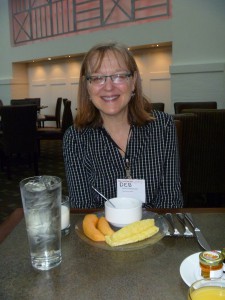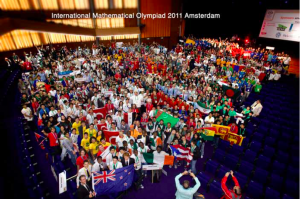Snow December 2011
Nice little snowfall overnight:
Math, Teaching, and Other Items of Interest
Archive for the ‘General interest’ Category.
Nice little snowfall overnight:
After Hales proved in 1999 the Hexagonal Honeycomb Conjecture—that regular hexagons provide the least-perimeter, minimal-interface way to tile the plane with unit areas—I decided I wanted hexagonal tiles for my kitchen:
 In the middle of the job, the contractor ran out of grout for the interfaces between the tiles. He had an excuse: he explained that hexagonal tiles apparently required more grout! That was the wrong time and place for that excuse. I had to respond: “Actually…”.
In the middle of the job, the contractor ran out of grout for the interfaces between the tiles. He had an excuse: he explained that hexagonal tiles apparently required more grout! That was the wrong time and place for that excuse. I had to respond: “Actually…”.
The snow came considerately Saturday night, leaving Williamstown splendid. Photos skiing around town this morning.
 Guest post by Professor Deb Bergstrand, Swarthmore College
Guest post by Professor Deb Bergstrand, Swarthmore College
Ed Burger’s invited MathFest address on recent work in number theory was masterful. He wowed the crowd at the end when he revealed that the new results he presented were discovered by his SMALL undergraduate research students during the summer of 2010, thus reinforcing his message that the mathematics of tomorrow will be produced by the students of today. Ed’s other direct role at the conference was the invited paper session he organized on “Offering students lessons beyond mathematics, through mathematics.” Continue reading ‘Good Times at MathFest 2011 in Lexington’ »
 When I visited Universiti Teknologi Mara in Kuala Lumpur, Malaysia, I was most impressed by the young mathematician who presided at my session, Nuru’l-‘izzah Othman. She summarized the session as follows, better than I could have:
When I visited Universiti Teknologi Mara in Kuala Lumpur, Malaysia, I was most impressed by the young mathematician who presided at my session, Nuru’l-‘izzah Othman. She summarized the session as follows, better than I could have:
Three golden rules for starting a mathematics project:
1. Start small. Try to start with small and manageable projects and avoid being too ambitious.
2. Start with something familiar or close to one’s heart.
3. Do what you enjoy doing and enjoy what you are doing. Continue reading ‘World Peace through Mathematics’ »
At the Math, Science, Technology Conference at Exeter in June, I met high school mathematics teacher Patricia Heather-Lea. She shared with me and now with you a message she once drafted but never sent to her students:
“Dear students, I know that you can reach anyone, anytime, anywhere, using technology. I want you to know that you must not lose sight of the here and now, to be able to look into someone’s eyes, and say:
I am sorry;
I love you;
Forgive me.
This ability is critical to the present and the future of the human race.
Love, Mrs. Heather-Lea”
Jianguo Cao, who passed on in June, was a good mathematician and correspondent. It was his paper with Itai Benjamini on the isoperimetric problem in surfaces of revolution that first proved, for example, that isoperimetric curves in the paraboloid {z=x2+y2} are horizontal circles. Many papers followed by many mathematicians, including me.
After writing a joint paper with Hugh Howards and Michael Hutchings and returning from leave, in cleaning out old files I discovered a preprint of Cao’s paper with Benjamini which Cao gave me at the Lehigh Geometry/Topology Conference in June, 1994. I forgot all about it and got interested in the problem two years later. The basic idea of our Theorem 2.1 came from Hutchings in an email message of December 19, 1996. But now I know that the first inspiration came from Cao.
The National Science Foundation is starting to require ethics training for students doing research on grants. Because of the clumsiness of programs available on the web, we developed our own program for the undergraduate researchers in the Williams College SMALL project. At the outset the students are provided with the following outline and some case studies for reading. Midway, there is a workshop on ethics, going over the outline and discussing principles and some cases.
Ethics Training Outline (Williams College Department of Mathematics and Statistics)
An important general principle is full disclosure. Whenever relevant, disclose any personal factors that could affect objectivity: relationships, business interests, etc. Feel free to discuss any concerns with a department chair, dean, or others confidentially.
A second important general principle is confidentiality. Check with your supervisor before sharing confidential materials with anyone. In general, outside of very limited professional consultation, confidential materials cannot be shared without permission.
1. Responsible teaching/mentoring. As a student you have the right and responsibility to keep relationships free of harassment and other kinds of inappropriate behavior. If you have any concerns, you should feel free to talk to a department chair, dean, or others. Sometimes they are required by law or by their institutions to report such conversations, but you can always ask about confidentiality and from whom it is available.
2. Research. The guiding principle is fidelity to the truth, the whole truth, and nothing but the truth. Present all the evidence, not just favorable selections. Cite sources and give credit where credit is due. Get permission when appropriate, as for the use of figures, illustrations, or data. Be sure no part of your research or manuscript could be considered plagiarism.
3. Publication. Submit to one place at a time. All co-authors should be informed and participate in decisions. Take care in writing and proof-reading.
4. Peer review. Journal submissions, grant applications, and tenure and promotion cases are often sent out to experts in the field for review. Disclose personal factors and limitations. Write from your own understanding and the evidence. Respond in a timely manner. Your review is generally kept anonymous, but there is some freedom and variability and you should understand the conditions.
5. Grading. Disclose to your supervisor or a dean any personal factors that could affect your objectivity. All grades are confidential; unless given permission by your supervisor, you should not discuss grades with or show homework assignments/exams/quizzes to anyone other than your supervisor. Your supervisor should know that such information may be shared only with colleagues who have a need to know or with the student’s permission. Feel free to discuss any concerns about your job or your students with your supervisor, the department chair, or a dean confidentially.
6. Human or animal subjects. If by chance you are ever involved with human or animal subjects, you will need to research the substantial ethics considerations beforehand.
Cases for discussion
1. “Group Project”
3. “Credit for work”
4. “Refereeing Papers”
5. You’re grading homework for a course. When you get back to your room, you find that a friend in the course has put his homework under your door instead of turning it in in class, with a note that says he’s giving it to you early because he can’t make it to class. What should you do?
6. You’re grading homework for a course and your friend’s mom asks you how he’s doing. He’s doing well. What should you say?
7. After you publish a paper you realize that you did not credit a lemma to another paper where you found it. What should you do?
8. You are a Math graduate student enrolled in an undergraduate physics course. When your physics professor finds out you are a graduate student, s/he starts coming to your office to personally hand back and discuss your homework. S/he stays for what you think are long periods of time and tries to steer the conversation to subjects that are personal. You are uncomfortable during these visits. What should you do?
9. You’re grading homework for a course and you find your roommate looking over the grades and comments. What should you do?
10. “Graduate Program Applications”
March 2012 Notices AMS article on “Ethics for Undergraduate Researchers” by Mike Axtell and Chad Westphal provides more cases for discussion.

The closest hotel to Universiti Malaysia Terengganu is the Gem Beach Resort on the South China Sea, here pictured from my private balcony. The water is clean and warm, with a pleasant breeze off the sea.
Herbert Federer, one of the founders of geometric measure theory, was a good friend to me. I met him at my first conference, at Park City, Utah, as a graduate student in 1977. My advisor at Princeton, Fred Almgren, was one of his graduate students and had shared fond memories with us students.
The first talk was completely incomprehensible to me, and I was afraid I would be exposed as a mathematical ignoramus. I hoped somehow to sneak quietly out of the lecture room. As we filed out in twos from opposite sides of the room, I was alarmed to find myself paired with the famous Federer. As he turned to me I prepared for the inevitable humiliation. His words: “I didn’t understand a word of that talk. Let’s go for a walk and you can tell me about your thesis.” From that day I found him a good friend. Continue reading ‘Herbert Federer’ »